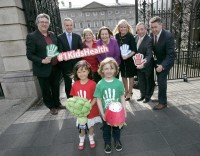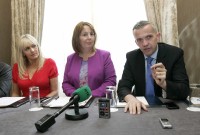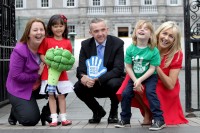Children First Committee Stage with the Minister for Children and Youth Affairs, James Reilly TD, Wednesday 23 Sept 2015
Video of my speech: youtube.com/watch?v=fbYCdc1F2hE
Proposed Amendment to ban the corporal punishment of children.
“28. The Non-Fatal Offences Against the Person Act 1997 is amended by the substitution for section 24 of the following –
“Abolition of common law rules in respect of immunity from criminal liability for punishing a child.
- Any rule of law under which any person is immune from criminal liability in respect of physical chastisement of a child, whether the person is a parent or guardian of the child, a person with custody of the child either temporarily or indefinitely, a teacher, or a person in loco parentis in respect of the child either temporarily or indefinitely, is hereby abolished.””
I would like to begin by acknowledging and thanking Peter Newell of Global Initiative to End All Corporal Punishment of Children, which promotes the universal prohibition and elimination of corporal punishment.
In November 2012, the people of Ireland voted to enshrine the protection of children as individual rights holders into the Irish Constitution. Following a defeated Supreme Court appeal, it was signed into law on 28 April 2015. Article 42A.1 states: The State recognises and affirms the natural and imprescriptible rights of all children and shall, as far as practicable, by its laws protect and vindicate those rights.
What I am proposing in this amendment is to ensure that all citizens are equal in the eyes of the law.
Why do we still believe it is acceptable for corporal punishment to be in our laws?
What is corporal punishment? The Committee on the Rights of the Child defines “corporal” or “physical” punishment as any punishment in which physical force is used and intended to cause some degree of pain or discomfort, however light. Most involves hitting (“smacking”, “slapping”, “spanking”) children, with the hand or with an implement – a whip, stick, belt, shoe, wooden spoon, etc. But it can also involve, for example, kicking, shaking or throwing children, scratching, pinching, biting, pulling hair or boxing ears, forcing children to stay in uncomfortable positions, burning, scalding or forced ingestion (for example, washing children’s mouths out with soap or forcing them to swallow hot spices). In the view of the Committee, corporal punishment is invariably degrading.
Adults have a talent for inventing euphemisms to make them feel more comfortable while they inflict pain and humiliation, such as spanking or smacking. The truth is that, for a child, all of this is violence, and if it were directed at an adult it would constitute criminal assault.
Minister, I am very conscious that often people believe this issue is a judgement on how they were raised. I would like to take this opportunity to welcome my mother Jenny to the gallery and she will concur that I was raised with the “you’re not too old for the wooden spoon” ringing in my ears. Thankfully she never used it – indeed only in Ireland is the wooden spoon not seen solely as a kitchen utensil but as a weapon. Times have moved on and our understanding of the effects of corporal punishment on children has increased.
There are many other good reasons to ban corporal punishment:
- It can cause serious harm to children;
- It teaches children that violence is an acceptable way of solving conflicts;
- It is ineffective as a means of discipline and there are positive ways to teach, correct or discipline children which are better for the child’s development and health;
- It is more difficult to protect children from severe abuse if some forms of violence are legitimate.
In tandem Minister, we must provide parents with sufficient support in bringing up their children, including through educating parents about good parenting skills.
Minister, 46 states, including 28 in the wider Europe, have prohibited all corporal punishment including in the family and another 51 states have clearly and publicly committed to achieve a full ban.
Ireland has been found to be in violation of the European Social Charter (by the Council of Europe’s European Committee of Social Rights) by failing to ban all corporal punishment against children. However, I hope the Government will find itself in a position to accept this amendment because it is the right thing to do. We must uphold and protect Children’s Rights.
Mr. Janusz Korczak, a Polish-Jewish paediatrician, educationalist and children’s author, wrote in his 1925 book The Child’s Right to Respect: “In what extraordinary circumstances would one dare to push, hit or tug an adult? And yet it is considered so routine and harmless to give a child a tap or stinging smack or to grab it by the arm. The feeling of powerlessness creates respect for power. Not only adults but anyone who is older and stronger can cruelly demonstrate their displeasure, back up their words with force, demand obedience and abuse the child without being punished. We set an example that fosters contempt for the weak. This is bad parenting and sets a bad precedent.”
Sweden brought in their laws in 1979 – now 36 years ago. In a publication to mark the 30 years since Sweden’s abolition of corporal punishment their then Minister Maria Larsson wrote: “When violence is used against children, their confidence in the adult world is damaged. And there is good reason to believe that if this violence is exercised by the child’s own parent, or by someone else close to them, the damage is greater.”
Since 2006, the EU has emphasised the promotion and protection of children’s rights as a priority issue. The European Parliament, in a 2009 resolution on the situation of fundamental rights across the EU 2004-2008, called for a total ban on corporal punishment in all Member States. Again in November 2014, the Parliament adopted a resolution calling on Member States to uphold their obligations and combat any form of violence against children “including by formally prohibiting and sanctioning corporal punishment against children”.
Recently, our Permanent Representative to the United Nations in New York, David Donoghue, said that Ireland had a central role in achieving sustainable development as co-facilitators of the UN negotiations together with Kenya on “Transforming our world: the 2030 Agenda for Sustainable Development”.
I note SDG 16 to promote peaceful and inclusive societies for sustainable development, provide access to justice for all and build effective, accountable and inclusive institutions at all levels and particularly SDG 16.2 therein to end abuse, exploitation, trafficking and all forms of violence against and torture of children.
Minister, colleagues, children’s rights experts and advocates in Ireland concur.
Tanya Ward, Chief Executive, Children’s Rights Alliance:
“The Children’s Rights Alliance unites over a 100 organisation working with children and their families across the country. Since our establishment in 1995 we have repeatedly called for the removal from Irish law of the defence of reasonable chastisement of children.
Research is clear that corporal punishment has no benefits and carries causes children physical and psychological harm and can lead to short and long-term effects on their safety, health and development. There is no justification for corporal punishment and it is clearly at odds with Article 42A of the Constitution which “recognises and affirms the […] rights of all children” and commits to protect and vindicate those rights by its laws. Children have an absolute right to be protected from harm and abuse under the UN Convention on the Rights of the Child which Ireland ratified in 1992, there are no exceptions.
This coming January, Ireland’s progress on children’s rights will be examined by the UN Committee on the Rights of the Child, the Committee has criticised Ireland’s position on corporal punishment in 1998 and 2006 and are likely to do so again in 2016. The Children’s Rights Alliance has been leading the civil society engagement with the UN Committee and has prioritised corporal punishment as a key concern. There is no reason to delay, Ireland has a moral and legal duty to protection children from corporal punishment.”
Grainia Long, Chief Executive, ISPCC:
“As the national child protection charity, the ISPCC has long supported a ban on physical punishment of children. Through our national listening service, Childline, we hear on a daily basis the impact of violence towards children. Last year we responded to nearly 37,000 contacts from children regarding abuse or welfare, and many were from children who were anxious, traumatised and scared in their own home, due to violence.
We strongly support the amendment to remove the defence of reasonable chastisement, and believes that it meets the spirit and intent of the Children First legislation. Whatever the circumstance, there is no reason why the law should permit a defence of hurt or violence towards a child. Far too often, the debate centres on the needs or preferences of parents, rather than the rights of the child. The recent change to our constitution following the Children’s Referendum requires us to think very differently and put children at the heart of our considerations. Seanad members therefore have a long overdue and timely opportunity to place in law the right of a child to be safe in their own home, and we hope this opportunity will be grasped, in the best interests of children.”
Laura Haugh, mum-in-residence / spokesperson for MummyPages.ie :
“MummyPages.ie is Ireland’s largest online parenting community, and our members wholeheartedly support the campaign to repeal the defence of reasonable chastisement by parents and childminders (up to 3 children) in Irish law.
Slapping another person, and especially a vulnerable child is wrong in all circumstances. Firstly, allowing slapping by a caregiver to a child under the term ‘reasonable chastisement’, is legalising physical violence to another person and a form of child abuse. It demonstrates that it’s ok for a person to hit another person and indeed that it’s ok for a bigger or stronger person to hit a smaller or weaker person. This kind of behaviour can lead to intense abuse in the home for the child that does not learn quickly from the ‘reasonable chastisement’ and it is at complete odds with what is acceptable in today’s adult society or indeed the school playground.
Initially the child is hurt by the physical action and emotional breakdown of trust between parent and child that they forget what they have done wrong. What you want in effective discipline is for the child to understand what they have done wrong, and the consequences of their actions to others. You want the child to feel remorse but ultimately to still believe that they are a person of value, slapping does not promote this.
The main principle in promoting desirable behaviour is for the child to feel good and therefore be good. This is why regular positive affirmations of good behaviour is a much more effective tool to maintain this type of behaviour than anything else.
It is now well researched that when responding to an incident with a child that requires discipline; tuning into the child to understand exactly why they misbehaved, helping them to realise how their behaviour might affect others, and consistent follow-through with age appropriate consequences is much more effective than physical chastisement, no matter how ‘reasonable’ it is perceived.”
Minister, I am conscious of the comments made in February this year by Pope Francis.
For me it was encouraging to see the response by both the Vatican and indeed at national level.
I wish to cite from the letter written by Mary McAleese to the Irish Times, which noted that the Vatican was a signatory to the UN Convention on the Rights of the Child and that the relevant Treaty Monitoring Body, the Committee on the Rights of the Child, wants all corporal punishment of children to be banned.
She added “In submissions to that Committee last year, the Vatican said it did not promote corporal punishment, citing “respect for the inviolability of physical life and the integrity of the person…”.
The Vatican responded by appointing Peter Saunders, Founder of the National Association for People Abused in Childhood, UK, to the The Papal Commission for the protection of minors and was asked to lead on the Commission’s non-violence against children working group.
I contacted Peter Saunders earlier today and he advised me that the members of the working group are unanimous in their position that violence or reasonable chastisement of children is never justifiable.
Irish abuse survivor Marie Collins is also a member The Papal Commission for the protection of minors. In discussions with both Marie Collins and Peter Saunders they are extremely supportive of Ireland updating its laws to bring into effect a ban on corporal punishment in Ireland.
Marta Santos Pais, Special Representative of the Secretary General on Violence against Children, advocates that corporal punishment can be prevented “[b]y supporting caregivers in the use of non-violent child rearing practices; by promoting advocacy and social mobilisation to safeguard children’s dignity and physical integrity; by reforming laws to introduce a clear ban of all forms of violence including corporal punishment, we can make a real difference in the life of children, all children, everywhere and at all times,”
Irish law is now out of step with parents, children’s rights advocates and international best practice. With this amendment we have a way to unite and agree that all citizens are equal.


